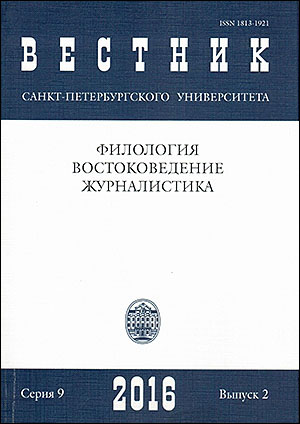«I am Sick and Tired of Conforming»: On Emancipation Narratives
DOI:
https://doi.org/10.21638/11701/spbu09.2016.204Abstract
The article present an analysis of emancipation narratives (ENs), or autobiographical stories with a liminal plot which recount the first time the narrators identified with feminist ideas and/or values – an event we will refer to as feminist conversion. The study sample included 152 narratives in English (Internet posts and comments on the topics How did you become interested in feminism?; How did you/I become a feminist? and the collection Becoming feminists: An anthology of how we became feminists. Toronto, 2011). The narratives appeared online in 2009-2013 and were produced by women aged 15-65, all of them residents of the UK, USA and Canada and self-labelled feminists. Our findings suggest that ENs are a valuable source of evidence on the cultural, social and political factors which female narrators consider relevant to feminist conversion, as well as on the mechanisms involved in the narrative reconstruction of causes, consequences and axiological dimensions of conversion.
Downloads
References
Библиография:
Агафонова Е. Е. Анализ проблемы идентичности в постмодернистском феминизме. Автореф. дис. … канд. соц. наук. М., 2010.
Брайдотти Р. Путем номадизма // Введение в гендерные исследования.Часть II: Хрестоматия. СПб.: Алетейя, 2001. С. 136–163.
Брокмейер Й., Харре Р. Нарратив: проблемы и обещания одной альтернативной парадигмы // Вопросы философии. 2000. № 3. С. 29–42.
Варшавская А. И. Языковые единицы и отношения совместности. СПб.: Изд-во СПбГУ, 2008. С. 199.
Воронина О. А. Проблема идентичности в феминизме постмодернити // Философия и культура. № 9 (45). 2011. С. 61–75.
Гредновская Е. В. Кризис гендерной идентичности: дискурсы и практики (социально-философский аспект анализа). Автореф. дис. … канд. филос. наук. Екатеринбург, 2007.
Жеребкина И. Противоречия в теории современного феминизма. URL: http://www.owl.ru/win/info/we_my/2000_sp/04.htm(дата обращения: 14.02.2015).
Зарецкий Ю. Свидетельства о себе «маленьких» людей: новые исследования голландских историков.URL: visantrop.rsuh.ru/article.html?id=1167089 (дата обращения: 04.03.2015).
Коваленко Е. Н. Основные понятия политического дискурса российского феминизма в сети Интернет. URL: polit.psu.ru/vestnik/kovalenko.htm(дата обращения: 25.04.2015).
Кубрякова Е. С. О термине «дискурс» и стоящей за ним структуре знания // Язык. Личность. Текст. М.: Языки славянских культур, 2005. С. 23–33.
Лауретис Т. де. Риторика насилия // Антология гендерной теории. Минск: Пропилеи, 2000. С. 351.
Пушкарева Н. Л. Как заставить заговорить пол? (Гендерная концепция как метод анализа в истории и этнологии). URL: journal.iea.ras.ru/archive/2000s/2000/Pushkareva_2000_2.pdf (дата обращения: 25.03.2015).
Ратиани И. Теория лиминальности. Проблема современного литературоведения. URL: irmaratiani.ge/teoria.htm(дата обращения: 02.12.2013).
Рождественская Е. Ю. Нарративная идентичность в автобиографическом интервью // Социология: методология, методы, математическое моделирование. № 30. 2010. С. 5–26.
Салиева Л. К. Нарративный анализ. История и современность. Сферы приложения. URL: istina.msu.ru/media/publications/article/076/cf6/2967914/_doc_1.pdf(дата обращения: 20.05.2015).
Смейкалова-Стрикланд И. Нужен ли феминизм чешским женщинам? // Антология гендерной теории. Минск: Пропилеи, 2000. С. 382.
Солодкова Е. В. Женский автореферентный дискурс в английском языке. Автореф. дис. … канд. филол. наук. Иркутск, 2012.
Темкина А. А. Феминизм: Запад и Россия // Преображение (Русский феминистический журнал). 1995. № 3. С. 5–17.
Темнова Е. В. Современные подходы к изучению дискурса // Язык, сознание, коммуникация. М.: МАКС Пресс, 2004.
Тюпа В. М. Очерк современной нарратологии. URL: philology.nsc.ru/journals/kis/pdf/CS_05/cs05tupa.pdf (дата обращения: 11.02.2015).
Тюпа В. М. Нарратив и другие регистры говорения // Narratorium. № 1–2. 2011. URL: narratorium.rggu.ru/article.html?id=2027584(дата обращения: 18.03.2015).
Чернов А. Ю. Нарративный анализ стратегий самораскрытия женщин с лесбийской идентичностью // Российский психологический журнал. Т. 6. № 2. 2009. URL: rpj.sfedu.ru/index.php/rpj/article/viewFile/395/607 (дата обращения: 18.05.2015).
Шмид В. Проза как поэзия. СПб.: Инапресс, 1998. С. 268–269.
Шоуолтер Э. Наша критика // Современная литературная теория. Антология. М.: Флинта, 2004. С. 314–333.
Becoming Feminists: An anthology of how we became feminists. Ed. by L.M. Gajardo, J. Ryckman. Toronto, 2011. URL: oise.utoronto.ca/cwse/UserFiles/File/Becoming%20Feminists.pdf (дата обращения: 20.11.2013).
Benhabib S. Feminism and postmodernism: An uneasy alliance // Feminist Contentions. A Philosophical Exchange. URL:marxists.org/subject/women/authors/benhabib-seyla/uneasy-alliance.htm (дата обращения: 14.02.2015).
Burke P. Representations of the self from Petrarch to Descartes // Rewriting the self: histories from the Middle ages to the present / Ed. Roy Porter. London, 1997. P. 17–28.
Butler J. Gender trouble: Feminism and the subversion of identity. New York, London, 1999.
Crenshaw K. Mapping the margins: Intersectionality, identity politics, and violence against women of color // Stanford Law Review. Vol. 43. 1991. P. 1241–1299.
Dekker R. Egodocuments in the Netherlands from the sixteenth to the nineteenth century // Envisioning Self and Status. Self-representation in the Low Countries 1400–1700 / Ed. Erin Griffey. Hull: ALCS, 1999. (Crossways Vol. 5). P. 255–284.
Dekker R. Jacques Presser's heritage. Egodocuments in the study of history // Memoria y Civilización. Anuario de Historia. 2002. № 5. P. 13–37.
van Dijk T.A. . The study of discourse // Discourse as structure and process. London: Sage, 1997. P. 1–34.
Greyerz K. von. Ego-documents: The last word? URL: univie.ac.at/igl.geschichte/griesebner/Wise10_11/Materialien_Dipldiss/greyerz.pdf (дата обращения: 14.03.2015).
Herman D., Vervaeck B. Postclassical Narratology // Routledge Encyclopedia of Narrative Theory / Ed. by David Herman, Manfred Jahn and Marie-Laure Ryan. New York, 2005. URL: books.google.ru/books?id=1O4FzO0ORAAC&printsec (дата обращения: 15.02.2015).
Jorgensen M. W., Phillips L. J. Discourse analysis as theory and method. London: Sage, 2002.
Laclau E., Mouffe C. Hegemony and socialist strategy. London: Routledge, 1985.
Leaper C., Arias D. M. College women’s feminist identity: A multidimensional analysis with implications for coping with sexism // Sex Roles. № 64 (7–8). 2011. P. 475–490.
Ochberg R. L. Life stories and storied lives // Exploring Identity and Gender. Ed by A. Lieblich and R. Johnson. Thousand Oaks, London: Sage, 1994.
Spivak G. In other worlds: Essays in cultural politics. New York: Routledge, 1988.
Downloads
Published
How to Cite
Issue
Section
License
Articles of "Vestnik of Saint Petersburg University. Language and Literature" are open access distributed under the terms of the License Agreement with Saint Petersburg State University, which permits to the authors unrestricted distribution and self-archiving free of charge.






